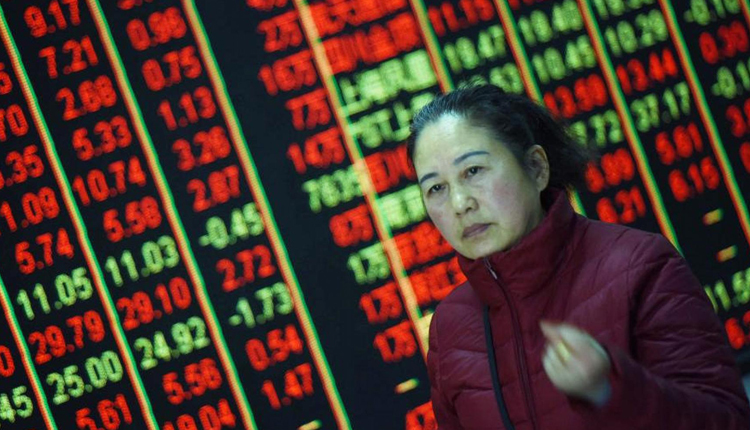Asian markets slipped on Thursday, but pared some of the steeper losses seen earlier after China announced it was planning for a new round of trade talks with the United States.
Beijing said it had accepted an invitation from the U.S. to take part in trade negotiations in late August. The country’s vice commerce minister Wang Shouwen will lead the Chinese delegation in talks with U.S. officials. China’s commerce ministry added that China was against unilateralism and protectionism, but was open to dialogue.
Greater China markets narrowed losses following the news, with the Shanghai Composite last trading lower by 0.87 percent after opening more than one percent down. Hong Kong’s Hang Seng Index slipped 0.61 percent.
Other major markets in the region also retraced some of their earlier losses. The Nikkei 225 slipped 0.2 percent, trading both in and out of positive territory. The benchmark had earlier lost more than 300 points.
South Korea’s Kospi declined by 0.96 percent, as its tech sector turned in a mixed performance after its U.S. counterparts came under pressure overnight. SK Hynix was among the major names affected, sliding 1.45 percent while Samsung Electronics saw a fall of 1.99 percent.
Elsewhere, the ASX 200 edged lower by 0.11 percent, with energy and materials leading the dip following a fall in commodity prices overnight.
Shares in Japan, South Korea and China had fallen more than 1 percent earlier in the session. MSCI’s index of shares in Asia Pacific excluding Japan was last lower by 0.31 percent in Asia afternoon trade.
The trade-related news was seen as a positive development, but market reaction was also tempered by other factors, such as concerns over U.S.-China trade ties, the stronger dollar and the slowing Chinese economy.
“On a strategic basis, [the U.S. administration] sees China as a global strategic adversary … so while these discussions will go on and they’re very positive, we think it’s too early to call the end game for these tariff exchanges and where this could end up,” Wayne Gordon, commodity, rates and FX analyst at UBS Wealth Management, told CNBC’s “Street Signs.”
“It’s a good thing, it will support markets. It will help risk, particularly ex-U.S., but nonetheless, it’s a bit early to talk about that,” he added.
The offshore yuan recovered following news of the latest U.S.-China trade developments, last trading at 6.8935 to the dollar at 12:22 p.m. HK/SIN. That compared to the 6.95 touched overnight.
Before the market open, the People’s Bank of China had set the official mid-point at 6.8946 per dollar, marking a sixth consecutive day of declines, according to Wind Info. The on-shore yuan last traded at 6.8966.
Losses in Asia also came on the back of declines in markets stateside: The Dow Jones Industrial Average lost 137.51 points to close at 25,162.41. The Nasdaq Composite dropped 1.23 percent and the S&P 500 finished the session lower by 0.76 percent.
Following the release of disappointing quarterly earnings, shares of Tencent were down 2.92 percent, extending recent losses. Profit for the quarter ending in June dipped 2 percent to 17.87 billion yuan ($2.59 billion), missing expectations. That was also the first decline in profit for the company in almost 13 years.
The result had seen tech shares in the U.S. come under pressure overnight. The sector fell more than 1 percent following the disappointing announcement from the Chinese tech giant. Tencent has stumbled in recent sessions, with Thursday’s declines coming as its gaming business came under greater regulatory scrutiny.
The iShares MSCI Emerging Markets ETF (EEM) fell more than 2.9 percent overnight on the back of that, moving into bear-market territory — a drop of more than 20 percent from recent highs.
“China is still growing, but not as fast as it was, and again, expectations are rising that Chinese growth moderates further. Activity data released for July earlier this week gave this hypothesis a further nudge. Other EM (emerging market) countries are struggling right now,” said ING economists in a note.
Although ING added that much of what was causing the current bout of market pain was “reversible,” it added that “the probability of a flip into a more negative economic equilibrium gathers by the day.”
Concerns related to Turkey’s currency crisis were also in the background after the country’s currency dropped to a record low earlier this week. The lira held on to overnight gains to trade at 5.9730 to the dollar at 12:21 p.m. HK/SIN, strengthening after Turkey cut offshore banks’ access to its currency.
The dollar index, which tracks the dollar against a basket of currencies, edged lower. The index was last at 96.489 after touching a 13-month peak overnight.
In Southeast Asia, Indonesia’s central bank on Wednesday raised interest rates by 25 basis points to 5.5 percent. Bank Indonesia has cumulatively increased rates by 125 bps so far this year.
Source: CNBC


